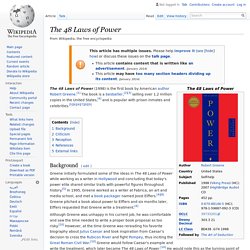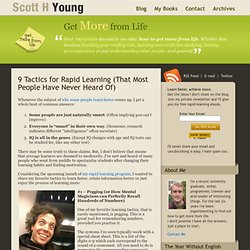

Thou shalt not commit logical fallacies. Infographic: Write It Down. Scientists discover most relaxing tune ever - Music - ShortList Magazine - StumbleUpon. Nine Stubborn Brain Myths That Just Won't Die, Debunked by Science. Travel Games You Can Play With Just Your Brain - Offbeat Guides Blog. The thing about traveling to faraway places is that it can take a while to get there. When you’re six hours into your journey and you’ve exhausted all possible topics of conversation, what can you and your bored companions do? These handy travel games can be played anytime, no boards or decks of cards required.
A Billion Questions A lot like the game “20 Questions”, but this version can go on much, much longer. How to Play: One person thinks of something. Bed, Marry, or Kill How to Play: Name three celebrities (like David Letterman, David Duchovny, and Snoop Dogg). Would You Rather…? The 48 Laws of Power. Background[edit] Greene initially formulated some of the ideas in The 48 Laws of Power while working as a writer in Hollywood and concluding that today's power elite shared similar traits with powerful figures throughout history.[5] In 1995, Greene worked as a writer at Fabrica, an art and media school, and met a book packager named Joost Elffers.[4][8] Greene pitched a book about power to Elffers and six months later, Elffers requested that Greene write a treatment.[4] Although Greene was unhappy in his current job, he was comfortable and saw the time needed to write a proper book proposal as too risky.[10] However, at the time Greene was rereading his favorite biography about Julius Caesar and took inspiration from Caesar's decision to cross the Rubicon River and fight Pompey, thus inciting the Great Roman Civil War.[10] Greene would follow Caesar's example and write the treatment, which later became The 48 Laws of Power.[10] He would note this as the turning point of his life.[10]

Study Guides and Strategies - StumbleUpon. The Power Of The Mind: How To Train Yourself To Be More Successful : Managing. How can you use the latest discoveries in brain science to improve your life?

Here are some techniques. November 02, 2011 Leadership tycoon Warren Bennis once said, “We seem to collect information because we have the ability to do so, but we are so busy collecting it that we haven’t devised a means of using it. The true measure of any society is not what it knows but what it does with what it knows.” There is a wealth of information at our disposal today on the latest discoveries in brain science.
We can either drown in this information or turn it into a lifesaver by extracting its practical knowledge. Use visualization to learn a new skill Neuroplasticity is the ability of the brain to continuously create new neural pathways. In a Harvard University study, two groups of volunteers were presented with a piece of unfamiliar piano music. Albert Einstein, who is credited with saying that “imagination is more important than knowledge,” used visualization throughout his entire life. The Manager's Cheat Sheet: 101 Common-Sense Rules for Leaders - StumbleUpon.
The 50 Best Mind Hacks on the Web. Image: JanneM/Flickr Mind hacks.

Ever since Tom Stafford and Matt Webb introduced us to the hidden logic of our upstairs system in their 2004 neuroscience tome, these simple tricks have taken the blogosphere by storm. Nowadays, there’s a hack for everything, from your sex life to your kitchen stove. We compiled the Web’s 50 best mind (and life, and career, and…you get the point) hacks. These self-improvement gleanings are bound to make you a better, well, everything: Work and Career Five rules for keeping your inbox empty. Thinking like a genius: overview - StumbleUpon. Thinking and recall series Problem solving: creative solutions "Even if you're not a genius, you can use the same strategies as Aristotle and Einstein to harness the power of your creative mind and better manage your future.

" The following strategies encourage you to think productively, rather than reproductively, in order to arrive at solutions to problems. "These strategies are common to the thinking styles of creative geniuses in science, art, and industry throughout history. " 9 Tactics for Rapid Learning (That Most People Have Never Heard Of) & Scott H Young - StumbleUpon. Whenever the subject of why some people learn faster comes up, I get a whole host of common answers: Some people are just naturally smart.

(Often implying you can’t improve)Everyone is “smart” in their own way. (Nonsense, research indicates different “intelligences” often correlate)IQ is all in the genes. (Except IQ changes with age and IQ tests can be studied for, like any other test) There may be some truth to these claims. Considering the upcoming launch of my rapid learning program, I wanted to share my favorite tactics to learn faster, retain information better or just enjoy the process of learning more: #1 – Pegging (or How Mental Magicians can Perfectly Recall Hundreds of Numbers) One of my favorite learning tactics, that is rarely mentioned, is pegging.